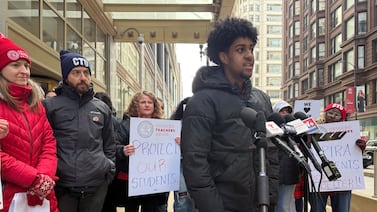Beyond High School is our free monthly newsletter covering higher education policy and practices in Colorado. Sign up to get it delivered to your inbox early.
A coalition of liberal groups hope to put a tax reform measure on the November 2026 ballot that could result in significant additional funding for K-12 schools and higher education.
The Protect Colorado’s Future coalition wants to amend a portion of the state’s constitution that mandates a flat income tax rate, currently set at 4.4%.
The draft measure, which the group unveiled Wednesday, would ask voters to approve a new graduated income tax. Taxes would remain at the same rate for earners making under $500,000 a year and progressively increase for earners who make above that threshold, up to 9.2% for earners who make $10 million or more. The group projects that lower earners would save several hundred dollars a year.
Protect Colorado’s Future estimates these changes would generate between $2 billion and $3 billion in new annual revenue for the state. The money would pay for K-12 education, higher education, child care, and health care. State lawmakers would decide how much to invest in each area.
Members of the coalition say the measure is necessary because the state is facing another projected revenue shortfall, exacerbated by cuts in the federal budget. State lawmakers already held an August special session to address a shortfall this year caused by federal tax policy changes. Colorado’s revenue challenges are expected to continue into the 2026-27 budget year.
“It is going to take steps toward our North Star of every student having the resources they need,” said Lisa Weil, executive director of Great Education Colorado, a member of the coalition. “It’s not going to complete the journey, but it is an absolutely critical first step.”
The coalition includes 13 advocacy groups, including the Colorado Statewide Parent Coalition, Colorado Children’s Campaign, and New Era Colorado.
Chris deGruy Kennedy, who is president of The Bell Policy Center, an organization that advocates for progressive policies and tax reforms, said a flat tax benefits wealthier residents.
The coalition has crafted multiple versions of the ballot measure to help gauge what voters want from the initiative. For instance, one version includes more funding for public safety, while another says the money should go toward workforce development.
DeGruy Kennedy said these versions might not end up as the final version that Coloradans vote on. However, the coalition’s ask to change income tax rates will remain the same in the final measure.
The next step is for the coalition to receive a ballot title and then begin to collect signatures to place one of the versions on the 2026 ballot. If it gets on the ballot and is approved by voters, the new tax structure would go into effect in 2027. The money raised would not be subject to a state cap on revenue collections within the Taxpayer Bill of Rights, or TABOR.
DeGruy Kennedy said he wants the measure to act as the beginning of a public conversation about public benefits that he sees as underfunded in the state. Asking voters to invest in education is within each of the proposals.
Weil pointed out that Colorado lawmakers have struggled to greatly increase funding for K-12 and higher education.
During economic downturns, lawmakers have cut state spending on college and university budgets, which has shifted tuition costs onto families.
Lawmakers also spent less than constitutionally required on K-12 schools for 14 years through a mechanism known as the budget stabilization factor, which pulled school funding for other budget priorities. Schools lost out on over $10 billion from 2009 to 2023.
Although lawmakers ended that practice, their promises to increase K-12 funding have hit snags.
Last year, state lawmakers created a new K-12 funding formula that calls for Colorado to invest $500 million more a year in its schools. But the timeline to phase in the money has already been extended by legislators due to budget challenges.
Even that investment isn’t enough, according to studies commissioned by state lawmakers. The studies found that Colorado should invest another $3.5 billion to $4 billion a year on top of the formula changes to adequately meet students’ learning needs.
The ballot measure is sure to receive conservative opposition. Conservative groups are proposing ballot measures that would cut income tax rates, similar to those approved in 2020 and 2022.
Weil said she hopes the coalition can make the case for its measure. Without the money, she said there’s a huge risk to the state’s education system.
“Colorado is at a moment where we have to decide who we are, who we want to be, and how to meet a very challenging moment,” she said. “And I believe that Colorado values public education.”
Jason Gonzales is a reporter covering higher education and the Colorado legislature. Chalkbeat Colorado partners with Open Campus on higher education coverage. Contact Jason at jgonzales@chalkbeat.org.





